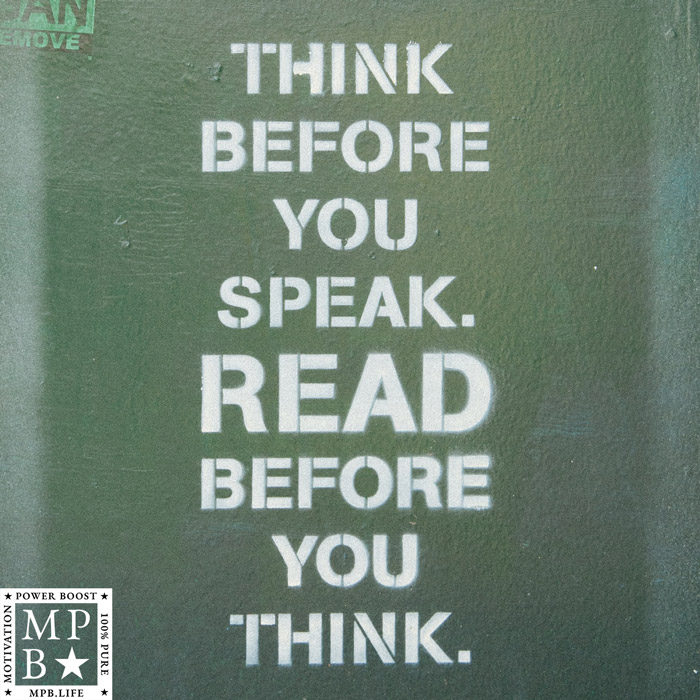
Think Before You Speak Read Before You Think Graphic © motivationpowerboost.com
THINK
BEFORE YOU
SPEAK.
READ
BEFORE YOU
THINK.
The Power of Contemplation: Harnessing the Wisdom of Reading and Reflection
In the fast-paced, ever-changing landscape of modern life, we often find ourselves caught up in a whirlwind of thoughts, opinions, and reactions. Amidst this chaos, it is easy to forget the profound impact that our words can have on others and ourselves. The quote “Think before you speak. Read before you think.” serves as a powerful reminder of the importance of cultivating a mindful approach to communication and personal growth.
Thinking before speaking is a skill that requires practice and self-awareness. It involves taking a moment to pause, reflect, and consider the weight of our words before we utter them. By doing so, we not only demonstrate respect for those around us but also ensure that our messages are clear, concise, and purposeful. This practice can help us avoid misunderstandings, conflicts, and regrets that may arise from hasty or ill-considered statements.
However, the true power of this quote lies in its second part: “Read before you think.” Reading is a transformative act that expands our horizons, challenges our preconceptions, and nourishes our minds with new ideas and perspectives. By immersing ourselves in the written word, we gain access to a vast repository of human knowledge, experience, and creativity. Through reading, we can explore different cultures, philosophies, and ways of life, broadening our understanding of the world and our place within it.
Moreover, reading serves as a catalyst for critical thinking and self-reflection. As we engage with the thoughts and insights of others, we are prompted to question our own beliefs, assumptions, and biases. This process of intellectual inquiry and introspection enables us to develop a more nuanced and empathetic worldview, one that recognizes the complexity and diversity of human experience.
By prioritizing reading as a means of personal growth and intellectual development, we equip ourselves with the tools necessary to navigate the challenges and opportunities of life with grace, wisdom, and compassion. We become more thoughtful, articulate, and confident in our interactions with others, as we draw upon the wealth of knowledge and insight that we have accumulated through our reading.
In a world that often prizes speed, efficiency, and instant gratification, the act of reading and reflection may seem like a luxury or a bygone practice. However, it is precisely in these moments of contemplation and introspection that we find the clarity, purpose, and resilience needed to thrive in an ever-changing world.
So, let us embrace the wisdom of this quote and make a conscious effort to think before we speak and read before we think. By doing so, we not only enrich our own lives but also contribute to a more thoughtful, compassionate, and enlightened society. In the end, the power of contemplation lies not only in the words we speak but in the depths of understanding and empathy that we cultivate through the transformative act of reading.
The Transformative Journey of Self-Discovery
Embarking on a path of reading and contemplation is not merely an intellectual exercise but a transformative journey of self-discovery. As we immerse ourselves in the written word, we inevitably confront perspectives, ideas, and narratives that challenge our preconceived notions and long-held beliefs. This encounter with the unfamiliar is an opportunity for personal growth and self-reflection.
In the process of reading, we engage in an active dialogue with the author, questioning their assumptions, evaluating their arguments, and ultimately forming our own opinions. This critical analysis not only sharpens our analytical skills but also enables us to gain a deeper understanding of ourselves – our values, biases, and the underlying motivations that shape our worldview.
Furthermore, reading exposes us to the rich tapestry of human experience, allowing us to vicariously traverse diverse cultures, epochs, and philosophical traditions. This exposure broadens our horizons, cultivating empathy and compassion for perspectives that may initially seem foreign or unfamiliar. By stepping into the shoes of characters from different walks of life, we develop a heightened appreciation for the complexities and nuances that underpin the human condition.
As we navigate this transformative journey, we may encounter moments of discomfort or cognitive dissonance, where our deeply held beliefs are challenged or even shattered. However, these moments of discomfort are essential catalysts for growth, prompting us to re-examine our assumptions and construct a more nuanced and well-rounded understanding of the world around us.
Ultimately, the act of reading and contemplation is not merely a means of acquiring knowledge but a profound exercise in self-discovery. It is a journey that invites us to confront our limitations, embrace uncertainty, and embrace the ever-evolving nature of our identities. By engaging in this process with courage, humility, and an open mind, we can unlock the transformative power of reading and emerge as more thoughtful, empathetic, and self-aware individuals.
Related Inspirational Quotes
“Knowledge is the antidote to fear.” – Ralph Waldo Emerson
“The seat of knowledge is in the head, of wisdom, in the heart.” – William Hazlitt
“Wisdom is not a product of schooling but of the lifelong attempt to acquire it.” – Albert Einstein
“If you have knowledge, let others light their candles in it.” – Margaret Fuller
“To know that we know what we know, and to know that we do not know what we do not know, that is true knowledge.” – Nicolaus Copernicus
